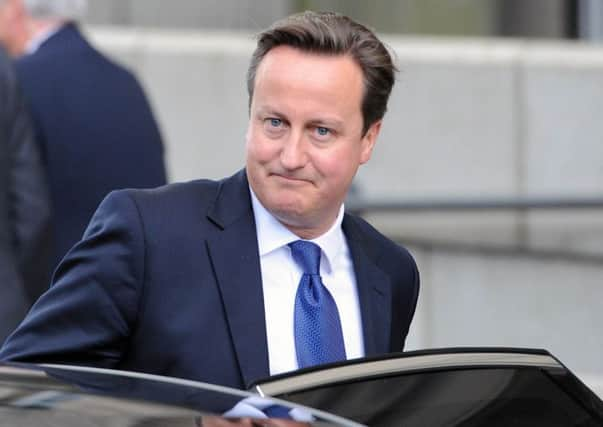Leaders: ‘Westminster effect’ on independence


Scots generally are more to the left of centre than the rest of the UK – the two main political parties avowedly so.
Now comes a poll showing that, such is the antipathy to the prospect of the Conservatives winning the Westminster general election next May, 41 per cent of Scots say they would vote Yes in the independence referendum should David Cameron look like winning.
Advertisement
Hide AdAdvertisement
Hide AdWhile 42 per cent said they would still vote No if Mr Cameron was returned, the ICM poll suggests that the prospect of Tory success at UK-level could tempt Labour supporters to back independence. A resurgence of Conservative support south of the Border could help the SNP and the Yes campaign narrow the gap even further and put the outcome on a knife edge.
Logically, the mooted outcome of the Westminster general election more than a year hence should not have a significant bearing on how Scots vote in the referendum. The issue should be decided after consideration of Scotland’s prospects in the event of independence and what is best for the country. But this is also a referendum vote strongly influenced by feelings of identity and belonging. And a large majority of Scots – to judge by the collapse in Conservative support over the past 20 years – have made clear a strong antipathy to the party, however much it insists it has changed from the Thatcher era.
This hostility reflects the fact that Scotland feels itself vulnerable to a continuation of public expenditure restraint and welfare reforms. For the present, polls show Labour continues to enjoy a lead over the Conservatives.
Despite the continuing recovery and that, for the first time in six years, pay rises are now running higher than the rate of inflation, David Cameron has found it difficult to convert the economic recovery into political support. The party continues to be dogged by misfortune elsewhere – most recently the controversy over expenses that forced Cabinet Minister Maria Miller from office.
And while the upturn looks on course to strengthen, the prospect of a rise in interest rates just before the election could dent the “feelgood factor” for millions of home owners. More immediately, however, the Better Together campaign may suffer further headwinds if more Scottish CBI members choose to defect from Britain’s biggest lobby group after it controversially decided to register with the anti-independence camp.
Labour’s strengths include its pledges to freeze energy prices and introduce a curb on bankers’ bonuses. But its weak spot continues to be voter uncertainty over the prime ministerial credentials of its leader Ed Miliband.
But much may yet transpire between now and 18 September before anyone can be sure of the “Westminster effect”.
Wake up to a longer lifespan
A GLORIOUS Easter weekend has brought thousands of walkers on to Scotland’s hills and into its glens. And many more have spent a vigorous two days in their gardens – raking, scarifying, mowing, weeding, sweeping up and tidying. It hardly seems right for an earnest lecture now on the virtues of a more active life when so many will be waking up to aching limbs.
Advertisement
Hide AdAdvertisement
Hide AdIt’s not that many in Scotland don’t already lead an active life. But it is still far too few. And even the “actives”, while prone to overdo it, are liable to mistake fitful exercise for the benefits of consistent, regular activity as part of their lifestyle.
The message from Dr Andrew Murray, a “Physical Activity Ambassador” for the Scottish Government, is that people who are inactive could increase their life expectancy by more than seven years if they started taking regular exercise. There is little that is new in his message, and most people will admit to a guilty acknowledgement of his case. The problem for many is embarking on a lifestyle change that has regular exercise built in. There is much that schools and workplaces can do to encourage this, but it is ultimately up to individuals to make the change.
As a nation, Scotland could see average lifespans jump from their current low levels to nearer those of countries where people consistently live longer. Physical inactivity is estimated to kill thousands of Scots and cost the NHS £91 million annually. So what better time to launch Scotland’s first Physical Activity Awareness Week – to prepare an active follow-through from the Glasgow Games? It is very much in the self-interest of those who do little exercise at any time of year to help themselves to health.